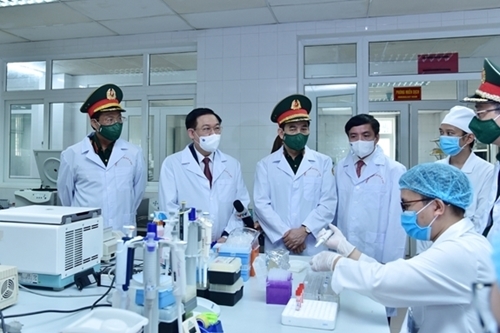On this occasion, Major General Nguyen Viet Luong, Political Commissar of Military Medical University (MMU), spent time with reporters from the People’s Army Newspaper sharing information about the safety and effectiveness of the Vietnamese vaccine developed by the Nanogen Pharmaceutical Biotechnology JSC.
    |
 |
|
N.A. Chairman Vuong Dinh Hue (second from the left) and Defense Minister Phan Van Giang (third from the left) visiting a lab of Military Medical University |
One of the units in charge of examining the Nanocovax vaccination is MMU. According to the Ministry of Health (MoH), together with the Pasteur Institute in Ho Chi Minh City, MMU had to enhance the clinical trials’ evaluation.
However, Nanogen and research groups agreed that the university should be responsible for adding further clinical trial results. Additional dossiers have been provided to the MoH, which include all of the points raised by the Licensing Board on August 29.
Meanwhile, in addition to the research findings, the units also compared IgG antibody levels at the 90th day between volunteers who received two doses of Nanocovax vaccination and recovered COVID-19 patients. As a result, persons who received the vaccine had much higher IgG antibody levels than COVID-19 patients who had recovered from the disease.
Although it was not included in the original protocol (due to the stable pandemic situation in the country with a low number of COVID-19 infections at the time of protocol development), General Luong stressed that this is an important additional assessment of the Nanocovax vaccine's protective efficacy.
Besides, research groups presented the results of a trial to assess the Nanocovax vaccine’s initial effectiveness against the Delta and Alpha variants of SARS-CoV-2. This is also additional information required by the Licensing Board.
Regarding the vaccine’s safety on over 14,000 volunteers, the Nanocovax vaccine was absolutely safe with no occurrences of anaphylaxis, affirmed General Luong.
According to General Luong, in order to assess the immunogenicity capacity, the Vietnamese domestically-developed vaccine had to pass four crucial tests required by the Licensing Board. The current data has been classified at the mid-term report of Phase III of the project.
The Nanocovax vaccine has been found to be safe on over 14,000 volunteers. The vaccine is effective in protecting humans against COVID-19 and initially with Delta and Alpha variants, according to the results of recent studies’ evaluation criteria as well as additional documents comparing the IgG antibody levels between volunteers and recovered COVID-19 patients.
Over 14,000 volunteers have been injected with the Nanocovax vaccine in all three phases so far. They are being closely monitored and evaluated. All of the volunteers appear to be in good health. Up to now, there are no reports of their life-threatening health issues. The other two cases of anaphylaxis level 1 and level 2 are now recovering. However, currently among the volunteers of Phase III, several volunteers caught COVID-19 infections but all of them have no symptoms. “We also cannot affirm whether they are volunteers receiving the vaccine or placebo volunteers because the ongoing research is still unclassified,” the general added.
It is clear to see that all COVID-19 vaccines now in use around the world have a certain rate of side effects, including anaphylaxis. However, no incidences of anaphylaxis have been reported so far with the Nanocovax vaccine, according to General Luong.
Normally, it takes time to develop a safe and effective vaccine, usually five to ten years on average or even longer. For less than two years, however, at least ten COVID-19 vaccines have been used around the world. So far, all COVID-19 vaccines that have been granted conditional emergency approval have followed the process and research steps in a scientific, thorough, and impartial manner. In fact, all vaccines are safe and protective, helping to lower infection rates, the number of patients with severe symptoms, and, most importantly, fatality rates, even on current variants like the Delta. “Results from the previous two trials show that Nanocovax is completely safe. Hence, the vaccine demonstrated similar effectiveness,” emphasized General Luong.
He reiterated that even if the Nanocovax vaccine receives a conditional emergency license, Vietnam will continue to research and supplement Phase III of the project according to the approved protocol.
In his opinion, the Nanocovax vaccine should be licensed as soon as possible to help preserve people’s health and lives, ensure vaccine security, and quickly bring life back to normal.
Translated by Minh Anh